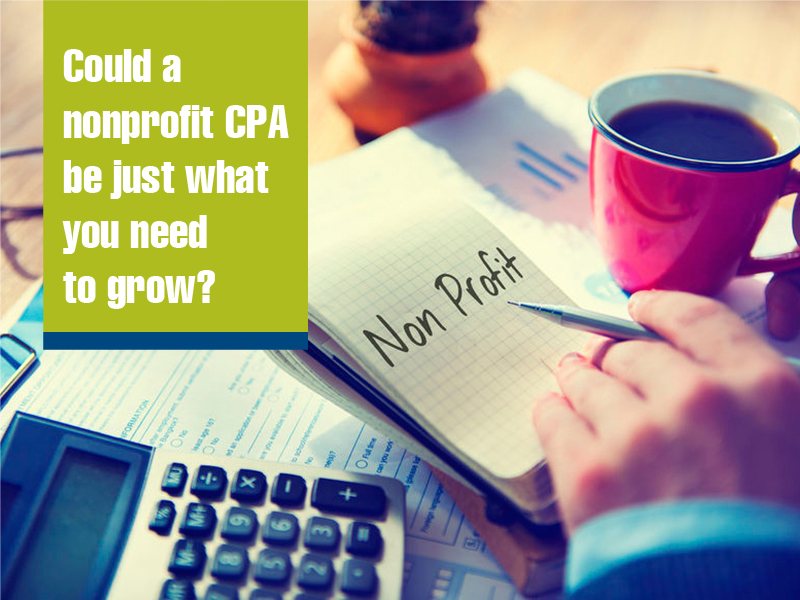Nonprofits today face increasingly stringent accounting, reporting, and regulatory requirements.
Meeting these requirements can feel like a burden, especially for smaller organizations. Limited budgetary resources and pressure from some funding sources not to invest too much money in the nonprofit’s infrastructure can make things even tougher.
Teaming up with a nonprofit-specific CPA is an important step; you need to get your organization to a point where it is ready to take the necessary steps for its future success…
5 nonprofit financial management requirements
Getting to the point where you understand what is required of you is a big step. But you need to take it before being able to fulfill the next important steps.
What does your nonprofit need to do to bridge the gap between what you’re prepared to do and what you need to do?
Following are several areas that typical nonprofits need to consider from a financial management and compliance perspective:
1. Proper segregation of donor-restricted funds from unrestricted funds in the accounting system;
2. A cost allocation methodology to allocate expenses between various functions/departments and to various restricted grants, and to track lobbying expenses;
3. Accounting policies to identify and track other items commonly found in nonprofits, such as lobbying activities and related party transactions;
4. Working knowledge of the unique state and federal regulatory nuances that impact nonprofit organizations (e.g. the public support test requirements, executive compensation protocol, private inurement, appropriate donor recognition for cash and noncash contributions, state charity registration, etc.)
5. A cost-effective, automated, well-designed, user-friendly accounting information system capable of producing meaningful financial reports that facilitate:
a. Well-informed decision-making by management and the board; and
b. Compliance with Generally Accepted Accounting Principles and IRS reporting requirements, e.g. general ledger, accounts payable, accounts receivable, financial reporting modules, integrated applications that automate invoicing, receiving and sending payments, and employee expense reports.
It’s far less daunting with the help of a nonprofit CPA…
While the above requirements may sound a little daunting at first, a nonprofit CPA is the ideal partner: either on a one-time project or with ongoing services.
A nonprofit CPA understands transactional bookkeeping, high-level accounting and reporting, automation of financial systems, financial management, and tax and regulatory compliance in non-profits.
But you’ve probably got some questions about the extra value that a CPA can provide…
Why should it be a CPA?
It’s pretty easy for anybody to launch a website and call oneself an “accountant” or “bookkeeper” even without proper training or education.
Many online accounting/bookkeeping “back office” services can sound appealingly inexpensive.
However, if it sounds too good to be true, it probably is. And mistakes can be expensive. With non-profits continuously under the microscope by donors, regulators, and the public, it’s important to choose professional practitioners you can trust.
To become a CPA, accountants are typically required to have the equivalent of a master’s degree (including extensive coursework in accounting and other business-related subjects), successful completion of a rigorous exam sequence, and significant professional experience under the supervision of a CPA.
Once licensed by the state, CPAs undergo ongoing annual continuing education activities and periodic peer review. These checks and balances help ensure that clients receive high quality accounting services.
Why a nonprofit-specific CPA?
The requirements facing non-profits are unique. Many concepts are simply not applicable to traditional businesses.
So, a CPA whose expertise relates primarily to their individual and business clients may not be familiar with the many nuances of nonprofits.
How can you tell if a CPA firm is nonprofit-specific enough?
Start off with their website.
Does it seem generic for multiple industries and individuals, or does it speak to your needs as a nonprofit?
After checking the website, talk to the principal(s). Ask questions such as:
- What percentage of their client base is nonprofit?
- Do they have a dedicated nonprofit division/department?
- If you hire them, who will be servicing your account, and how much of their continuing education activities are nonprofit-specific?
Already use a nonprofit CPA firm for your annual independent audit? They may be able to help…
However, your auditor must maintain their independence from the nonprofits they audit.
There are certain things they absolutely cannot do for their audit clients, such as performing management responsibilities or approving the classification of transactions. Additionally, when your auditor agrees to perform “non-audit” services, you must agree to take responsibility for those services and the auditor must be confident in your ability to oversee such services.
Your auditor can answer questions about best practices, technical accounting and tax concepts, as well as provide training services to your staff, and set up accounting software (including help with setting up the chart of accounts and financial statement format).
It’s important to have a conversation with your audit firm about what may or may not be appropriate in your circumstances.
For example, certain larger organizations and federal grantees may be subject to unique requirements that apply under the provisions of “The Single Audit Act” and/or the GAO’s Yellow Book, which allow for the provision of certain non-audit services while precluding others.
Looking for a nonprofit CPA to start helping you plan for your financial success? Contact us here.


